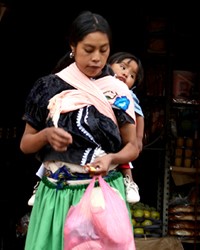Purepecha, Sierra Occidental in United States

Photo Source:
Edgar a secas - Flickr
Creative Commons
|
Send Joshua Project a map of this people group.
|
| People Name: | Purepecha, Sierra Occidental |
| Country: | United States |
| 10/40 Window: | No |
| Population: | 53,000 |
| World Population: | 281,000 |
| Primary Language: | Purepecha, Western Highland |
| Primary Religion: | Ethnic Religions |
| Christian Adherents: | 45.00 % |
| Evangelicals: | 5.00 % |
| Scripture: | Complete Bible |
| Ministry Resources: | Yes |
| Jesus Film: | No |
| Audio Recordings: | Yes |
| People Cluster: | Central American Indigenous, other |
| Affinity Bloc: | Latin-Caribbean Americans |
| Progress Level: |
|
Introduction / History
The Purepecha tribe was once called Tarascan. They live along the Sierra Madre Mountains in the state of Michoacan. The mighty Aztecs never conquered them mainly because the Purepecha were adept at forging and wielding metal weapons. The Spanish Empire did not engulf their ancestors until the 1530s, over a decade after the Aztecs were conquered. The Spaniards proceeded to use up the forests in the Purepecha homeland.
They have a subgroup with a different language called the Sierra Occidental Purephechas.
They are from Mexico, but some have migrated to the United States for work.
What Are Their Lives Like?
In the United States, the Sierra Occidental Purepechas usually socialize with others from Mexico, both indigenous and Latino. They become more Latino culturally in a foreign land. Sometimes their families suffer when a father leaves for months at a time.
What Are Their Beliefs?
The Sierra Occidental Purepecha were Christianized as part of Spanish Conquista. The church ideas were assimilated by the Purepecha people but not understood well until the 20th century. Mass was held in Latin until the 1950s, then Spanish. More recently mass is sometimes in Purepecha but usually still in Spanish. Evangelicals use more Purepecha, but even then, it is often Spanish because there are no Bible schools in Purepecha yet. Today they are primarily devoted to traditional religion and Roman Catholicism. There is an Evangelical minority among them.
What Are Their Needs?
Scripture portions were translated in the 1580s, the New Testament in 1968 and the whole Bible is now being translated as a United Bible Society project. The people are open to the gospel when presented appropriately. The Purepecha are mostly modernized (mobile phones, CD, television, radio, post-secondary education, etc.) but there are also areas that are still less developed (no plumbing, minimal education, etc.).
Prayer Points
Pray for a complete and accurate Bible translation in the Purepecha language.
Pray for the Holy Spirit to move in their local churches, drawing them to Jesus Christ, who is the truth.
Pray for them to put all their faith in the God of the Bible.